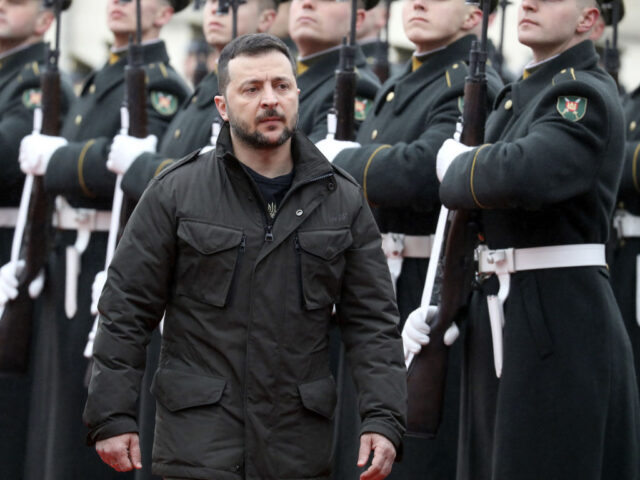Ukrainian President Volodymyr Zelensky has signed a decree “on the territories of the Russian Federation historically inhabited by Ukrainians”, saying it is time to “take steps” to out “the truth about our history”.
Speaking to mark Ukrainian Unity Day, a state holiday marking the 1919 Unification Act proclaiming the short-lived Ukrainian People’s Republic — largely absorbed into the Soviet Union the same year — President Volodymyr Zelensky spoke on Ukrainian pride and identity. While saying he was moving to give passports to all ethnic Ukrainians worldwide, President Zelensky also said he wanted to develop the “restoration of truth about the historical past” of Ukrainian areas in Russia.
The Ukrainian President said: “Today we must take steps not only to strengthen the unity of Ukraine and our people, but also to act for the unity of rights and freedoms, the truth about Ukrainians, the truth about us and the truth about our history. To this end, today I signed the decree ‘On the territories of the Russian Federation historically inhabited by Ukrainians’.”
Ukrainian Citizenship for Foreign Fighters, Says Zelenskyhttps://t.co/bGyxUWMuKK
— Breitbart London (@BreitbartLondon) January 22, 2024
The timing of the announcement to coincide with Ukrainian Unity Day offers some insight into what the President may have been referring to, given parts of 1919 Ukraine which it commemorates are now inside modern-day Russia.
Indeed, even beyond those short-lived borders, ethnic Ukrainians historically extended eastwards into modern-day Poland near Lublin and Krakov, and westwards beyond Crimea into Rostov and Saratov on the Volga in Russia.
Hours after the little-noted announcement, the President’s office published the decree, which lays out the systematic attempt to destroy Ukrainians “over the centuries”. The document states ethnic Ukrainians “historically inhabited” regions of the Russian Federation including the Oblasts: “Krasnodar Krai, Belgorod, Bryansk, Voronezh, Kursk, Rostov”. The oblasts represent between them around 125,000 square miles of Russia.
Ukraine has already launched a small counter-invasion of one of the historically ethnically Ukrainian regions claimed by President Zelensky as being an area where locals’ rights needed protecting from the Russian government, Belgorod. A pro-Kyiv and apparently U.S.-armed paramilitary launched an incursion into Belgorod Oblast last year, raising a ‘Free Russia’ flag in the Belgorod colours above some buildings before withdrawing back to Ukraine.
In the presidential decree, Ukraine called on Russia to observe the rights of ethnic Ukrainians living in Russia including giving them the right to learn Ukrainian to express cultural and religious ceremonies, and “the right to peaceful assembly”. It called for “an action plan for preserving the national identity of Ukrainians in the Russian Federation, including on the lands historically inhabited by them”, and said crimes committed against Ukrainians who had historically lived inside Russia should be studied.
The World is Taking Ukraine For Granted and Expects Success Too Quickly, Protests Zelenskyhttps://t.co/g53Ory4wzf
— Breitbart London (@BreitbartLondon) November 1, 2023
In some respects the decree is Ukraine using Russia’s own rhetoric against it, given Moscow’s professed pretext for invading Ukraine in what it euphemistically called a ‘special operation’ being the protection of “ethnic Russians” inside. Indeed, even President Zelensky himself is part of that Russian-speaking minority, having grown up speaking it as his first language. Russia had claimed those minorities were being subjected to genocide by the Ukrainian government.
When Russia invaded Donbas in 2014, it said it was doing so on behalf of ethnic Russians living there in the aftermath of the Euromaidan in Kyiv and subsequent anti-Euomaidan protests by pro-Russian activists in the east of the country. Western media have debunked some of Putin’s claims in this regard.
Orphan populations of ethnic groups isolated outside of their historic nations are not unusual in Eastern Europe, as shifting borders and collapsing empires in the 20th century left newly drawn frontiers unable to account for all groups. Ukraine is, in fact, party to a grinding long-term dispute with Hungary over just such a situation, as Ukraine has a sizable ethnic Hungarian-speaking minority in its western region.
Hungary has repeatedly accused Ukraine of mistreating the Hungarian minority, and some of the issues identified have been raised by the European Union, as it reviews the case for admitting Ukraine as a member or not. Hungary particularly notes Ukraine restricting the use of the Hungarian language in schools in Hungarian areas, which Ukraine now appears to be accusing Russia of in turn.
Russia, for its part, denied Zelensky’s claims that they had mistreated Ukrainians — in spite of all evidence to the contrary — with their Foreign Minister insisting they got along very well. Sergei Lavrov said on Monday that: “Contrary to the predictions of Kyiv propagandists, Russians and Ukrainians, and other nationalities, live there in peace and harmony”.
In 2023, WWI-Style Trench Warfare Came Back to Europe in Ukrainehttps://t.co/fshqnlRBQX
— Breitbart London (@BreitbartLondon) December 31, 2023

COMMENTS
Please let us know if you're having issues with commenting.